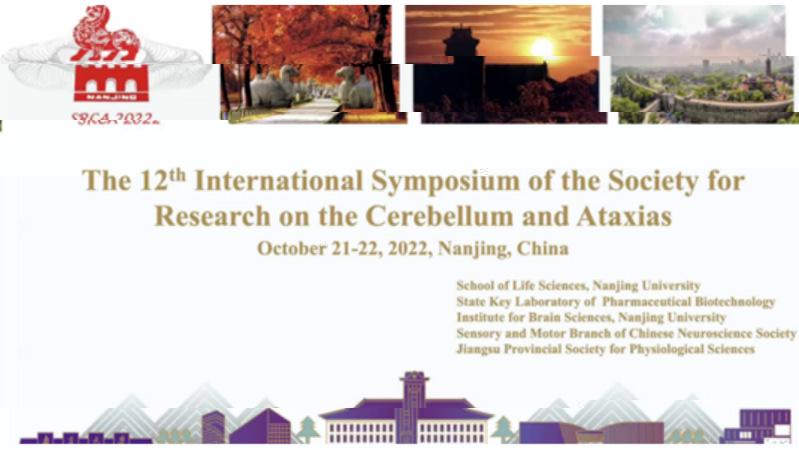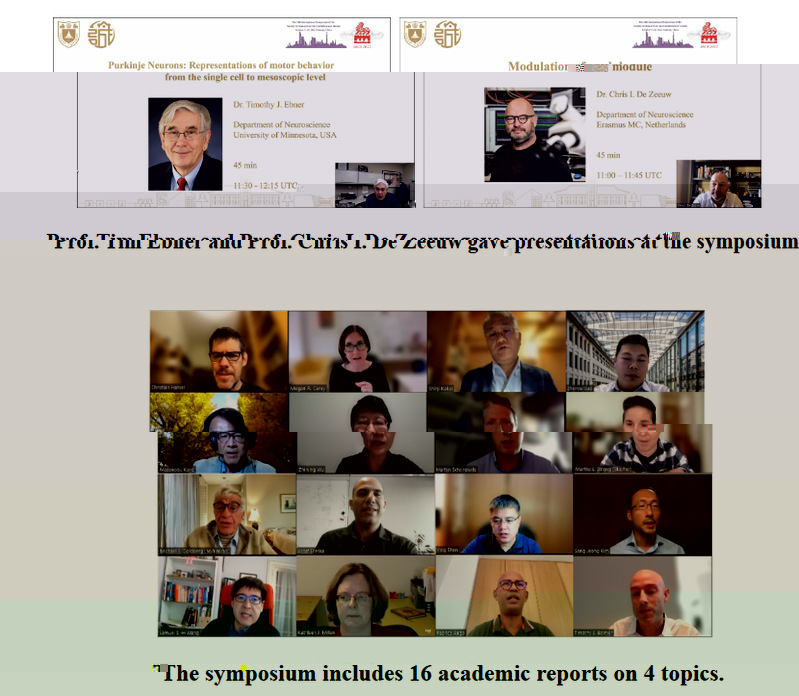On October 21-22 of 2022, the 12th International Symposium of the Society for Research on the Cerebellum and Ataxias (SRCA), hosted by Nanjing University, was successfully held. The symposium was planned to be held in person and were changed to online in response to the pandemic. Prof. Jun-Feng Zhang, vice president of Nanjing University, and Prof. Jean Mariani of Sorbonne University, president of the SRCA, as well as nearly 300 investigators, clinicians, and graduate students from China, the United States, the Netherlands, the United Kingdom, Germany, Portugal, Japan, and South Korea, attended the 12th International Symposium. The symposium was co-organized by School of Life Sciences, the State Key Laboratory of Pharmaceutical Biotechnology, the Institute of Brain Sciences of Nanjing University, the Sensory and Motor Branch of the Chinese Neuroscience Society, and the Jiangsu Society of Physiological Sciences. Prof. Jing-Ning Zhu, vice dean of School of Life Sciences of Nanjing University, served as the chair of the symposium, Prof. Ying Shen from School of Medicine of Zhejiang University served as the co-chair, and Prof. Jian-Jun Wang from School of Life Sciences of Nanjing University served as the honorary president.

Vice President Jun-Feng Zhang delivered a welcome speech at the opening ceremony. He expressed congratulations on the convening of the symposium and thanked the committee of the SRCA for their trust and strong support. He introduced the long history of Nanjing University, as well as the international and domestic contributions and status of life sciences, especially research on brain science, of Nanjing University. In addition, he pointed out that Nanjing University is the earliest institution in China to carry out research on the cerebellum, which has been passing on so far, and has made many remarkable research achievements. He also noted that we expected to carry out more international academic exchanges and cooperation in the future and explore the function and operating principle of the cerebellum jointly, a crucial brain structure with the largest number of neurons and a unique neural circuit organization.
Prof. Jian-Jun Wang, honorary president of the symposium, reviewed the painstaking history of the founding and development of research on the cerebellum in China, as well as the vigorous development of the Chinese research team on cerebellum in recent years. He hoped that Chinese and international cerebellar research can thrive like the magnificent dendrites of the Purkinje cells, the principal neurons of the cerebellar cortex.
Prof. Jean Mariani, president of the SRCA, expressed heartfelt thanks to our university and the organizing and program committees for their excellent organization. He reviewed the development of the SRCA and summarized the current situation and trend of the increasingly vigorous development of international neurobiology research on the cerebellum. He also reiterated the SRCA’s commitment to bringing together cerebellar research experts and scholars, boosting basic and clinical research on the cerebellum, promoting science popularization education of the cerebellum, and placed great expectations for this symposium to promote the development of international neurobiology on the cerebellum.

The symposium focused on the theme of “The Multifaceted Cerebellum: Motor Control and Beyond”. Prof. Timothy J. Ebner, dean of the Department of Neuroscience at the University of Minnesota, and Prof. Chris I. De Zeeuw, member of the Royal Dutch Academy of Sciences and dean of the Department of Neuroscience at Erasmus University Medical Center Rotterdam, were invited to give the “Ferdinando Rossi Memorial Lecture” and “Cerebellum Lecture”, respectively. A total of 16 experts and scholars from China and around the world in the field of cerebellar research gave excellent academic reports on four topics, including “motor control and motor learning”, “development and diseases”, “nonmotor functions” and “cell type diversity and circuit architecture”, and conducted in-depth discussions with the participants on the cerebellar internal model, the clinical investigation progress of cerebellar ataxia, the higher-order cognitive functions of cerebellum, the physiology of newfound cell types and neuronal circuits within cerebellum. Among them, two adamic reports, i.e., “Hereditary ataxia—experience in China” and “Diverse structural aberrations of cerebello-cerebral connections in an autism mouse model” from Prof. Zhi-Ying Wu and Prof. Ying Shen, respectively, famous Chinese scholars from Zhejiang University, have sparked heated discussions.

The successful holding of the 12th SRCA Symposium will further help to promote international academic exchanges and cooperation in the field of cerebellar research, which will help facilitate basic research and clinical studies of the cerebellum. At the opening ceremony, attending experts and scholars collectively viewed two videos showcasing Nanjing University and Nanjing, enabling them to fully appreciate the historical and modern beautiful integration of mountains, rivers, forests, and urban scenery in Nanjing, as well as the profound historical background, academic prowess, and cultural significance of our university.
